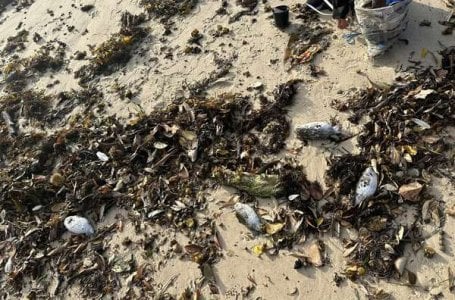Alarming Find Near Top Aussie Beach Could Endanger Your Next Visit – Here's What You Need To Know!
By
Seia Ibanez
- Replies 2
Australia's beaches are renowned for their beauty, attracting locals and tourists alike to their pristine sands and clear waters. However, a recent incident has raised concerns about the safety of these beloved spots. Beachgoers are being urged to exercise caution following a disturbing discovery near one of the nation's most frequented tourist beaches.
A considerable number of dead puffer fish, estimated to be between 50 and 100, were found by a dog walker early Friday morning at both Gordons Bay and Tamarama, just south of Sydney's iconic Bondi Beach. The sight was alarming enough to prompt local resident Amy to swiftly exit the area with her dog in arms, fearing the potential danger of stepping on one of the carcasses. 'I thought Oh my God. Then I picked my dog up and I absolutely left,' she recounted. The incident has understandably led to second thoughts about swimming in the area, with Amy stating, 'If Gordons Bay is where they're all congregating, I don't really want to swim there anymore.'
The size of the puffer fish varied, with some as long as a person's forearm. This is not an isolated event; just last month, a puffer fish twice that size was discovered in Geelong, Victoria. But what makes these fish so dangerous?
Puffer fish are known for their spines and the potent poison they contain, tetrodotoxin, which can vary in toxicity across different species. According to Professor Ashley Ward, an animal behaviour expert from Sydney University, while the likelihood of a dog consuming a puffer fish is low, it could be fatal if it were to happen. The Japanese fugu fish, a type of puffer fish, is infamous for its lethal potential and has been popularized by media, including an episode of The Simpsons. Despite being a delicacy in Japan, the fish must be prepared by expert chefs to remove the toxic organs, and even then, cases of poisoning do occur, albeit rarely.
In response to the discovery, Randwick City Council confirmed that their staff were removing the dead fish from Gordons Bay and that the NSW Beachwatch safety monitoring service had reported them at Tamarama beach. The incidents have been referred to the Environmental Protection Agency (EPA), and the council has stressed the importance of seeking urgent medical attention if anyone is 'stung' by a puffer fish.
The cause of the mass mortality remains a mystery. Unwanted bycatch from fishing, environmental factors such as high winds, changes in water temperature, algal blooms, or disease outbreaks could all be contributing factors. The council has warned that puffer fish are extremely poisonous and should be avoided, advising beachgoers in the Randwick City Council area to report any sightings to the lifeguards or call the council's customer service line.
Marine experts have weighed in on the situation, with some speculating that recent weather conditions may have driven the fish ashore. Professor David Booth, a marine ecology expert from Sydney University, emphasized that without dissecting the fish, it's impossible to determine the exact cause of death. He noted that while climate change and marine heatwaves are known to affect marine life, without concrete evidence, it's difficult to pinpoint a single cause for such events.

This incident serves as a stark reminder of the delicate balance within our marine ecosystems and the unexpected events that can occur. For those who love Australia's unique environment, it's essential to stay informed and vigilant, especially when visiting our beautiful beaches. If you come across any unusual marine life or pollution on the beach, do not hesitate to contact local authorities. Your actions could help prevent harm to others and contribute to the preservation of our coastal treasures.
A considerable number of dead puffer fish, estimated to be between 50 and 100, were found by a dog walker early Friday morning at both Gordons Bay and Tamarama, just south of Sydney's iconic Bondi Beach. The sight was alarming enough to prompt local resident Amy to swiftly exit the area with her dog in arms, fearing the potential danger of stepping on one of the carcasses. 'I thought Oh my God. Then I picked my dog up and I absolutely left,' she recounted. The incident has understandably led to second thoughts about swimming in the area, with Amy stating, 'If Gordons Bay is where they're all congregating, I don't really want to swim there anymore.'
The size of the puffer fish varied, with some as long as a person's forearm. This is not an isolated event; just last month, a puffer fish twice that size was discovered in Geelong, Victoria. But what makes these fish so dangerous?
Puffer fish are known for their spines and the potent poison they contain, tetrodotoxin, which can vary in toxicity across different species. According to Professor Ashley Ward, an animal behaviour expert from Sydney University, while the likelihood of a dog consuming a puffer fish is low, it could be fatal if it were to happen. The Japanese fugu fish, a type of puffer fish, is infamous for its lethal potential and has been popularized by media, including an episode of The Simpsons. Despite being a delicacy in Japan, the fish must be prepared by expert chefs to remove the toxic organs, and even then, cases of poisoning do occur, albeit rarely.
In response to the discovery, Randwick City Council confirmed that their staff were removing the dead fish from Gordons Bay and that the NSW Beachwatch safety monitoring service had reported them at Tamarama beach. The incidents have been referred to the Environmental Protection Agency (EPA), and the council has stressed the importance of seeking urgent medical attention if anyone is 'stung' by a puffer fish.
The cause of the mass mortality remains a mystery. Unwanted bycatch from fishing, environmental factors such as high winds, changes in water temperature, algal blooms, or disease outbreaks could all be contributing factors. The council has warned that puffer fish are extremely poisonous and should be avoided, advising beachgoers in the Randwick City Council area to report any sightings to the lifeguards or call the council's customer service line.
Marine experts have weighed in on the situation, with some speculating that recent weather conditions may have driven the fish ashore. Professor David Booth, a marine ecology expert from Sydney University, emphasized that without dissecting the fish, it's impossible to determine the exact cause of death. He noted that while climate change and marine heatwaves are known to affect marine life, without concrete evidence, it's difficult to pinpoint a single cause for such events.
Key Takeaways
- Beachgoers are warned to be cautious after a discovery of 50 to 100 dead puffer fish at Gordons Bay and Tamarama, south of Sydney’s Bondi Beach.
- Puffer fish contain a poison called tetrodotoxin which can be lethal if ingested, particularly concerning for pet owners.
- Randwick City Council is removing the puffer fish and has referred the incidents to the EPA, advising the public to seek urgent medical attention if stung.
- Experts are unsure of the cause of the mass puffer fish mortality, with factors such as winds, temperature changes, and disease all being considered as possible reasons.
This incident serves as a stark reminder of the delicate balance within our marine ecosystems and the unexpected events that can occur. For those who love Australia's unique environment, it's essential to stay informed and vigilant, especially when visiting our beautiful beaches. If you come across any unusual marine life or pollution on the beach, do not hesitate to contact local authorities. Your actions could help prevent harm to others and contribute to the preservation of our coastal treasures.








